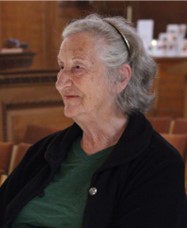
Thea Musgrave CBE (born 27 May 1928) is a Scottish composer of opera and classical music. She has lived in the United States since 1972. [1]

Thea Musgrave CBE (born 27 May 1928) is a Scottish composer of opera and classical music. She has lived in the United States since 1972. [1]
Born in Barnton, Edinburgh, Musgrave was educated at Moreton Hall School, a boarding independent school for girls near the market town of Oswestry in Shropshire, followed by the University of Edinburgh, and in Paris as a pupil of Nadia Boulanger from 1950 to 1954. [2] In 1958 she attended the Tanglewood Festival and studied with Aaron Copland. [3]
In 1970 she became guest professor at the University of California, Santa Barbara, a position which confirmed her increasing involvement with the musical life of the United States. She married American violist and opera conductor Peter Mark in 1971. [4] From 1987 to 2002 she was distinguished professor at Queens College, City University of New York. [5]
Among Musgrave's earlier orchestral works, the Concerto for Orchestra of 1967 and the Concerto for Horn of 1971 display the composer's ongoing fascination with 'dramatic-abstract' musical ideas. [6] More recent works continue the idea though sometimes in a more programmatic way: such as the oboe concerto Helios of 1994, in which the soloist represents the Sun God. Another frequent source of inspiration is the visual arts – The Seasons took its initial inspiration from a visit to New York's Metropolitan Museum of Art, while Turbulent Landscapes (commissioned by the Boston Symphony Orchestra and premiered by them in 2003) depicts a series of paintings by J. M. W. Turner. [7]
She has written more than a dozen operas and other music theatre works, many taking a historical figure as their central character, among them Mary, Queen of Scots (1977), Harriet Tubman ( Harriet, the Woman called Moses , 1984), Simón Bolívar (1993; premiere 1995 at the Virginia Opera) and Pontalba (2003). In 2008, her 80th birthday was marked by premieres of Points of View, Green, Cantilena, Taking Turns and other performances. [8]
In 2018, coinciding with Musgrave's 90th birthday, her compositions were performed at the Edinburgh International Festival and the BBC Proms. The opera Mary Queen of Scots made its ENO premiere in London on 15 February 2025, in a co-production with San Francisco Opera. [9] In 2018, her East Coast premiere of Aurora, (1999), was performed at the Naumburg Orchestral Concerts, in the Naumburg Bandshell, Central Park, in the summer series. [10]
In response to a question presented by Tom Service for the BBC about Musgrave's view of being a 'woman composer' she replied, "Yes I am a woman, and I am a composer. But rarely at the same time". [11] She admits that pursuing music can be a difficult career. When asked by the BBC to offer advice to young composers, she replied, "Don't do it, unless you have to. And if you do, enjoy every minute of it." [12]